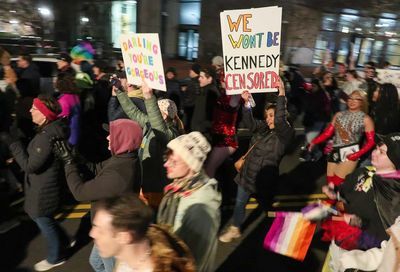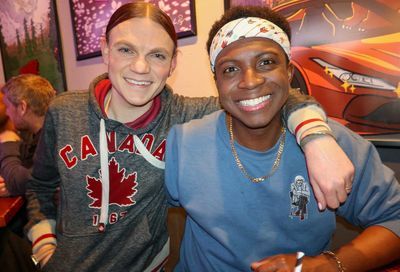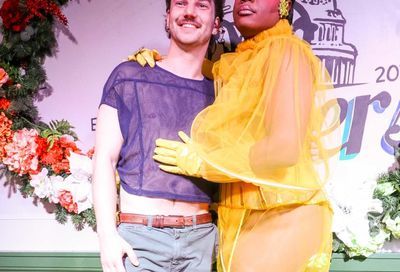Critical Confrontation
Local LGBT community questions U.S. Attorney's Office about Hannah case
”I’ll be very honest here. I wasn’t aware of the ‘gay panic defense.”’
Those words might have been taken more lightly by the 30 or so people who attended the community gathering between Gays and Lesbians Opposing Violence (GLOV) and representatives from the United States Attorney’s Office for the District of Columbia (USAO-DC) on Tuesday, Nov. 5, at the Foundry United Methodist Church in Dupont Circle, had they not belonged to Assistant U.S. Attorney Kevin Flynn.
Since January, Flynn had served as the prosecutor in the case against Robert Lee Hannah, who on Oct. 14 was sentenced to 180 days for ”simple assault” for his involvement in the death of Tony Randolph Hunter.
Hunter, a 37-year-old gay man from Clinton, Md., died on Sept. 17, 2008, as a result of injuries he sustained during a Sept. 10 attack by Hannah, while en route to a gay bar in the Shaw neighborhood.
GLOV has criticized the USAO-DC for accepting Hannah’s claim that Hunter inappropriately groped him before the attack; for failing to interview Hunter’s friend, who witnessed the attack and was also physically assaulted, in the four months following the incident; and for not prosecuting others who were with Hannah that night.
That alleged grope is the type of scenario often used to establish a “gay-panic defense”: generally an argument that gay men make unwanted sexual advances toward straight men, prompting straight men to respond with reflexive violence. Whether or not such advances occur, this defense strategy has been used to win courtroom sympathy for attackers of gays.
Tuesday’s meeting, an effort to strengthen trust and communication between the LGBT community and USAO predominately focused on the Hannah case.
David Mariner, executive director of The Center, D.C.’s LGBT community center, with which GLOV is affiliated, expressed outrage in addressing Flynn.
”The 30, or 40, or 200 years of experience that all you lawyers have, when you tell me that you’ve never heard of the gay panic defense, that erases it. It’s gone,” Mariner said. ”Because what you’re telling me is, ‘I’m completely unfamiliar with the GLBT community.”’
Flynn said he attended the meeting in part to learn how to be more ”responsive as a prosecutor,” adding that his revelation was ”made in complete sincerity.”
”I don’t think there’s anything valid about [the gay panic defense], and if it had come in another case a year ago, two years ago, five years ago, it would be something that holds no water for me.”
Kelsey Phipps, a grad student from Georgetown University, asked representatives from the USAO-DC how many of their lawyers are LGBT.
”You have two Georgetown students here who have applied to the [Department of Justice],” she said. ”I think you would have more familiarity with our community if you had folks who were not having to go out and learn about us, but who were a part of us.”
Albert Herring, executive assistant U.S. attorney for external affairs at the USAO-DC, said he’s not aware of any ”open LGBT” attorneys at the office.
While the USAO-DC released a 14-page sentencing memorandum in September outlining the government’s reasoning in charging Hannah with ”simple assault,” community members such as local transgender activist Jeri Hughes and gay activist Joel Lawson expressed frustration over the USAO-DC’s refusal to release Hannah’s confession or a ”redacted” version of it.
”We want that confession,” Lawson said. ”I can go on YouTube and see Bill Gates’s deposition. Why can’t we see this confession?”
Responding to Lawson, Flynn said there are certain matters in that case that have to remain confidential.
Mariner added that he does not believe that reasoning.
”I don’t buy it,” Mariner said. ”I think there’s something in there that you might not want us to see.”
Mariner’s voice trembled when talking about a recent incident involving three members of the local gay community who were assaulted earlier that week while leaving EFN Lounge after volunteering for an HIV-prevention program produced by The Center.
”Some of those folks didn’t press charges, didn’t even want to talk to the police, because they didn’t think anything was going to happen, or because… they don’t want to be publicly outed as GLBT,” Mariner said of the individuals he says were attacked in the same neighborhood where Hunter was attacked.
”But they were kicked, and they were bleeding and they were on the floor, and what’s happened in that particular neighborhood, whether you like it or not, as a result of [the Hannah case, there] is permission to do that, and permission for that to continue.”
Support Metro Weekly’s Journalism
These are challenging times for news organizations. And yet it’s crucial we stay active and provide vital resources and information to both our local readers and the world. So won’t you please take a moment and consider supporting Metro Weekly with a membership? For as little as $5 a month, you can help ensure Metro Weekly magazine and MetroWeekly.com remain free, viable resources as we provide the best, most diverse, culturally-resonant LGBTQ coverage in both the D.C. region and around the world. Memberships come with exclusive perks and discounts, your own personal digital delivery of each week’s magazine (and an archive), access to our Member's Lounge when it launches this fall, and exclusive members-only items like Metro Weekly Membership Mugs and Tote Bags! Check out all our membership levels here and please join us today!




















